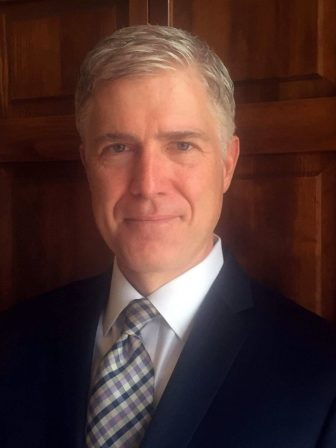
January 31, 2016; The Denver Post
Last night, Donald Trump announced his nomination of Neil Gorsuch, a judge currently serving on the Tenth U.S. Circuit Court of Appeals in Denver, to succeed Justice Antonin Scalia on the U.S. Supreme Court.
Gorsuch, 49, was educated at Columbia, Harvard Law, and received his doctorate from University College at Oxford as a Marshall Scholar. He is a fourth-generation native Coloradan, but spent his teenage years in the Washington, D.C. area when his mother, Ann Gorsuch, served as EPA Administrator in the Reagan administration.
Gorsuch’s legal career began when he served as a clerk for a U.S. appeals court judge and two U.S. Supreme Court justices, Byron White and Anthony Kennedy. (If confirmed, Gorsuch would be the first former clerk to serve as a justice alongside a justice for whom he clerked.) Following his clerkships, he was a law firm associate and partner in private practice for 11 years. Gorsuch was nominated to his present position in the Tenth Circuit by President George W. Bush in 2006 after a brief stint at the U.S. Justice Department.
Not surprisingly, Gorsuch has a reputation as a conservative jurist who looks to the original intent of the Constitution when framing decisions. In the Obamacare-related cases of Hobby Lobby Stores v. Sebelius and Little Sisters of the Poor Home for the Aged v. Burwell, he said the law “doesn’t just apply to protect popular religious beliefs: it does perhaps its most important work in protecting unpopular religious beliefs, vindicating this nation’s long-held aspiration to serve as a refuge of religious tolerance.” In Gutierrez-Brizuela v. Lynch, he wrote that the Supreme Court should revisit its “Chevron deference” doctrine asserting that courts should defer to executive branch agencies when interpreting ambiguous legislation. Gorsuch believes that Chevron deference allows ““executive bureaucracies to swallow huge amounts of core judicial and legislative power and concentrate federal power in a way that seems more than a little difficult to square with the Constitution of the framers’ design […] Maybe the time has come to face the behemoth.”
Sign up for our free newsletters
Subscribe to NPQ's newsletters to have our top stories delivered directly to your inbox.
By signing up, you agree to our privacy policy and terms of use, and to receive messages from NPQ and our partners.
Abortion rights advocates will likely oppose Gorsuch. Despite not having a judicial history on the subject of abortion, he wrote a book in 2006, The Future of Assisted Suicide and Euthanasia, in which he argues strongly for the inherent value of life as a matter of natural law as understood by the Constitution’s framers and espoused in the phrases “life, liberty, and the pursuit of happiness” and “to which the Laws of Nature and of Nature’s God entitle them” found in the Declaration of Independence.
Senate Democratic Leader Chuck Schumer (D-NY) has previously announced opposition to any “out of the mainstream“ Supreme Court nominee. After Gorsuch’s nomination announcement, Schumer said he has “serious doubts“ that Gorsuch is a mainstream judge. At least one senator, Jeff Merkley (D-OR), threatened a filibuster earlier this week unless Obama nominee Merrick Garland was selected—a near-certain impossibility. Merkley believes Senate Republicans “stole” the Supreme Court seat from Garland and wishes to make that point on the Senate floor. Ironically, Gorsuch wrote an opinion article for UPI in 2002 criticizing the then-Democratic-controlled Senate for delaying appeals court confirmations for both Merrick Garland and John Roberts, now Chief Justice of the U.S. Supreme Court. Late last night, Senate Democrats indicated they would insist on a filibuster-proof 60 votes to confirm Gorsuch.
Senate Republicans and other conservative supporters have an option should the Democrats vote as a bloc and deny Gorsuch a 60-vote confirmation. Several years ago, under Senate Majority Leader Harry Reid (D-NV), the Senate changed its rules to allow most presidential appointments (notably excluding Supreme Court nominations) to be confirmed with a 51-vote majority, thereby taking away the threat of filibuster. Since rules changes can be approved by a majority vote, the majority can literally make the rules. This “nuclear option” has been renamed the “Reid Rule” by conservatives advocating using the nuclear option to change Senate rules once again, this time to allow Supreme Court nominees to be approved by a simple majority of senators.
Gorsuch has precisely the educational and professional resume one would expect from a highly qualified Supreme Court nominee. Like Gorsuch, all eight sitting justices are Ivy League graduates. Like Gorsuch, most past and current justices clerked with appeals court or Supreme Court justices and served as appeals court judges. If confirmed, as an Episcopalian, he will be the Court’s lone Protestant; all eight current justices are either Catholic or Jewish. However, as Gorsuch himself observed in his 2002 article, “Politicians and pressure groups on both sides declare that they will not support nominees unless they hew to their own partisan creeds.” He continued, “Whatever else might be said about the [judicial confirmation] process today, excellence plainly is no longer the dispositive virtue.” Political pressure will be intense on all sides of the confirmation debate, adding to an already hyperpartisan and roiling Senate in the process of considering (or boycotting committee hearings to avoid considering) President Trump’s Cabinet appointees.—Michael Wyland













